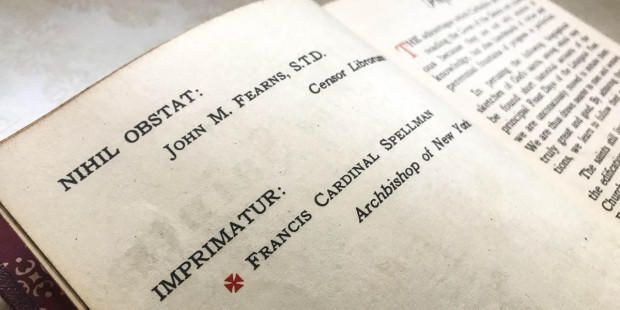And what is a “nihil obstat” or an “imprimi potest” that is similarly printed on the inside cover?
By Philip Kosloski, Aleteia, Aug 01, 2018
 If you open up a dusty old Catholic book (and some new ones), there are usually some Latin terms printed on the inside cover or copyright page. These words could be any of the following: imprimatur, nihil obstator imprimi potest.
If you open up a dusty old Catholic book (and some new ones), there are usually some Latin terms printed on the inside cover or copyright page. These words could be any of the following: imprimatur, nihil obstator imprimi potest.
What do those terms mean, and why are they printed in so many Catholic books?
The short answer is that these terms reflect the permission given by a Church authority to publish a particular Catholic book.
The current Code of Canon Law explains that “Books or other writings dealing with questions of religion or morals cannot be exhibited, sold, or distributed in churches or oratories unless they have been published with the permission of competent ecclesiastical authority or approved by it subsequently” (Can. 827 §4).
This type of permission also extends to liturgical books and collections of Catholic prayers. It is a way for the Church to “preserve the integrity of the truths of faith and morals” (Can. 823 §1).
Bishops are entrusted with the task of preserving the Catholic faith, and that task extends to any publication that deals with the teachings or devotional life of the Catholic Church. In this way, the Catholic faithful can remain confident that what they are reading is in fact consistent with what the Church believes and teaches. This gives a certain peace of mind.
More specifically, the terms imprimatur and imprimi potest mean, in Latin, “Let it be printed,” and represent the official approval of a local Church authority. A book that has an imprimatur has been officially approved by a local bishop or religious superior prior to publication. It is technically not an “endorsement” of a book, but simply a declaration that the book is “free” from theological errors to the best of the authority’s knowledge.
Books that have an imprimatur are usually first examined by a qualified censor who examines the content and gives his recommendation to the bishop. If nothing is found that could prevent its publication, it is given a nihil obstat, which essentially means “nothing stands in the way.”
So the next time you see these terms used in a Catholic book, you can rest assured that what follows is in accord with the Catholic faith and does not contradict any central teaching that has been handed down to us over the past 2,000 years.
Remember, too, that many kinds of Catholic books — personal essays, fiction, poetry, spiritual reflections, biographies, and more — do not require review by the competent ecclesiastical authority, because they do not deal with faith in a way that treats of doctrine or aims to teach in the name of the Church. The absence of an imprimatur in such personal works does not indicate that anything is contrary to faith and morals — or, indeed, that it bears the Church’s seal of approval. It simply means no imprimatur is canonically required.
https://aleteia.org/2018/08/01/what-is-an-imprimatur-found-in-certain-catholic-books/







